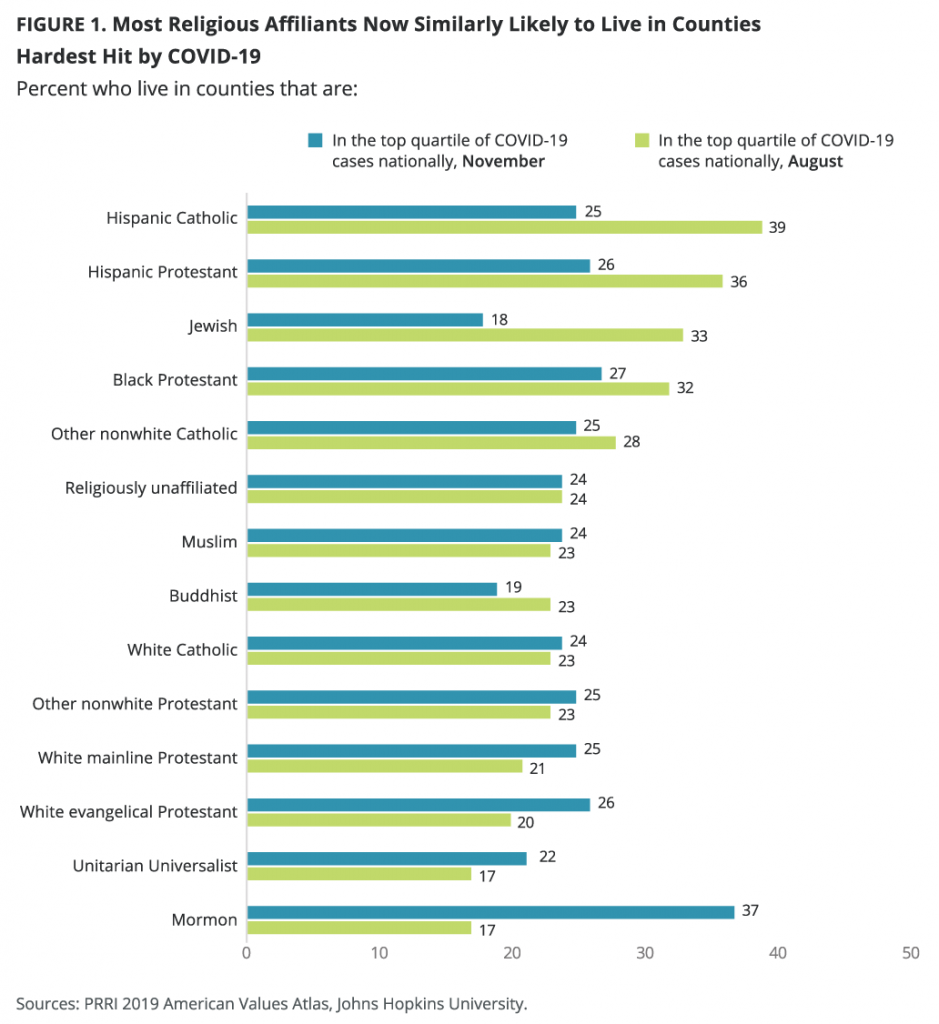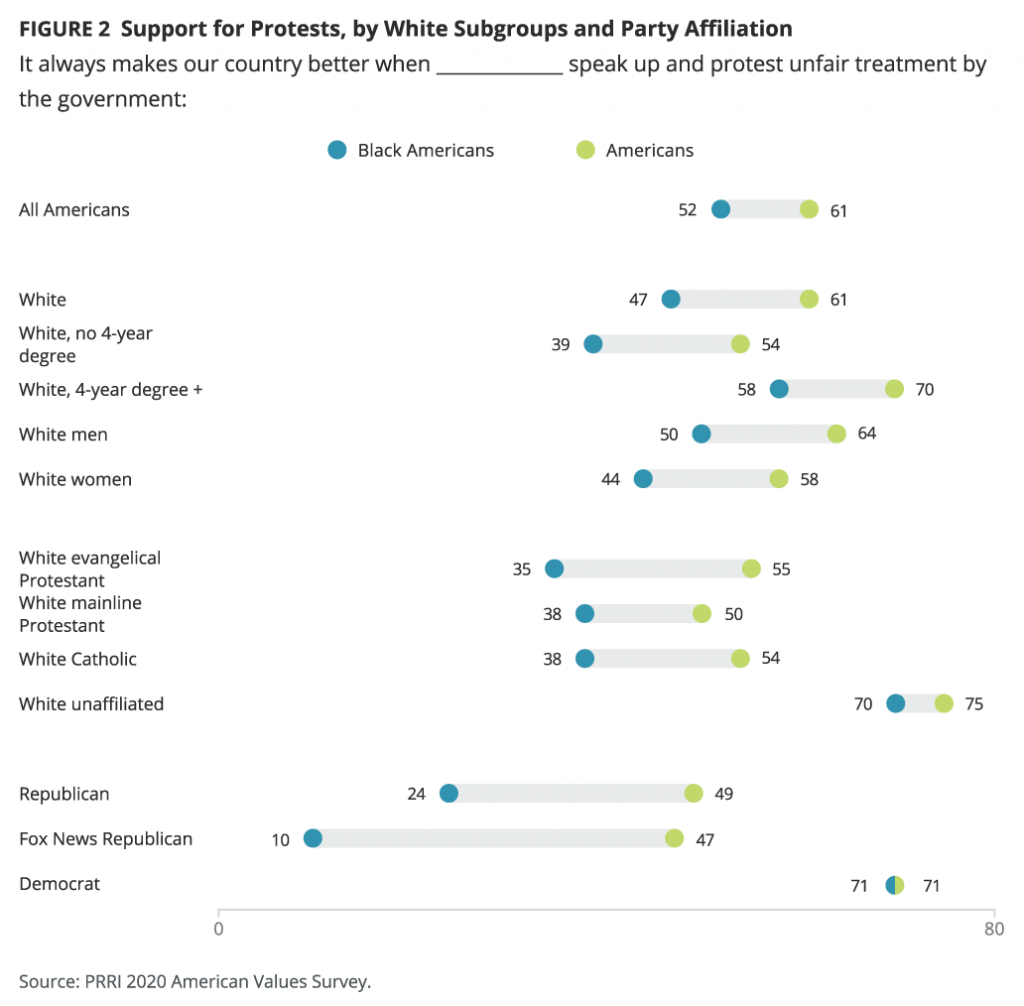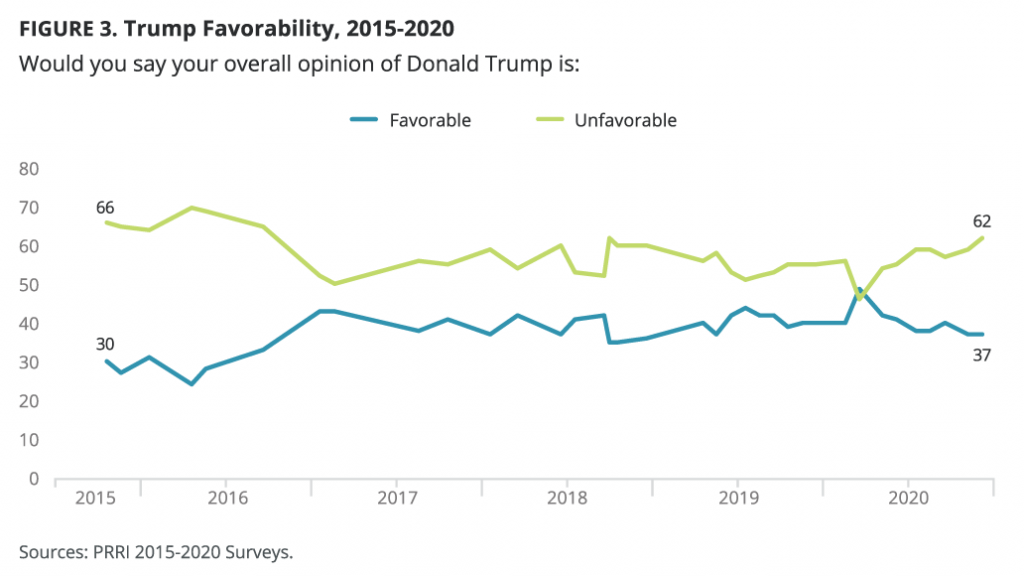Better Days Ahead
As 2020 draws to a close, we are taking a look back at how Americans coped with an extraordinary year and how the pandemic, widespread racial justice protests, and divisive election shaped our lives. To begin on a positive note, in our September American Values Survey Americans across the partisan spectrum found common ground in their optimism for the future: 61% of Republicans, 62% of Democrats, and 56% of independents agreed that America’s best days are ahead of us rather than behind us.
Here are 10 additional findings from PRRI’s work this year that describe life in the U.S. in 2020.
The Pandemic
1. As we have all experienced this year, Covid-19 drastically changed how Americans go about their day-to-day lives. In March, we found that large majorities of Americans said that they would avoid common activities to avoid catching or spreading the coronavirus, like attending a concert or sporting event (80%), getting on an airplane (79%), going to the movies (79%), or going to a restaurant or bar (74%).
2. The pandemic drastically changed religious life in the U.S. In April, we showed that most Americans who typically attend religious services were doing so online or not at all, and only 3% reported planning to attend in-person Easter or other religious holiday services. We also tracked how different religious groups were affected by the pandemic based on where they live. In the summer, most white Christians lived in areas with relatively mild virus outbreaks compared to the early virus spread in urban areas in which Christians of color and non-Christians mostly live. By November, no such differences existed; all religious groups were similarly likely to live in areas experiencing widespread outbreaks.

Protests for Racial Justice
3. Widespread protests against systemic racism and police brutality broke out across the nation in late spring and summer in response to high-profile police killings of Black Americans, including George Floyd and Breonna Taylor. Despite renewed attention to the issues, Americans are still deeply divided over the need for change. Around four in ten Americans (43%) say that police killings of Black Americans are isolated incidents, while 56% say they are part of a larger problem of how police treat Black Americans. Republicans and white evangelical Protestants are least likely to support racial justice issues and did not significantly change their views in 2020.
4. In an experiment to evaluate how the race of protesters influenced Americans’ perceptions of the protests themselves, PRRI divided a September survey into two demographically identical subsamples and gave each group the same question, differing only by the fact that one question specified the race of the protesters while the other did not. Americans are more likely to agree (61%) than disagree (37%) with the statement “When Americans speak up and protest unfair treatment by the government, it always makes our country better.” However, Americans are less likely to agree (52%) and more likely to disagree (47%) with the statement “When Black Americans speak up and protest unfair treatment by the government, it always makes our country better.” Differences in support for protests based on the race of the protesters are particularly large among white subgroups and Republicans.

President Trump and His Base
5. In March as the coronavirus first began spreading in the U.S., Americans were more likely to rate President Donald Trump favorably (49%) than unfavorably (46%), the only time during his presidency his ratings were more positive than negative since PRRI began asking the question in 2015. The effect was short-lived, and by April his ratings had fallen to 43% favorable and 54% unfavorable, with a notable downtick among older Americans. Opinion on Trump did not change during the summer protests or after he lost the election in November. Black Americans remained quite unfavorable toward the president throughout the year, while Hispanic Americans warmed up to Trump a bit.

6.Fox News has been a source of strong support for the president. For decades, the network has played a prominent role in structuring American conservatism and Republican partisan politics, and over the last four years President Trump has frequently used it as his personal platform. Fox News is by far the most trusted outlet among Republicans (40%), with the next most trusted source, local news, trailing distantly (14%). The dominance of Fox News among Republicans is also unique: there is no equivalent dominant news source among Democrats or independents. We tracked this group throughout the year. In April, those who trust Fox News most were more likely than anyone else to refer to the coronavirus as the “Chinese virus,” and in the fall they indicated that they do not trust President-elect Joe Biden to provide accurate information about the ongoing pandemic.
7. In June of 2020, the Supreme Court ruled that the 1964 Civil Rights Act protects gay, lesbian, and transgender people from employment discrimination. A substantial majority of Americans agree: 72% of Americans — including majorities of both political parties, all religious groups, and nearly every major demographic group — favor laws that would protect LGBT people against discrimination in jobs, public accommodations, and housing. Only about one in five (21%) Americans oppose these protections. These opinions have remained relatively stable since PRRI began asking this question in 2011. Additionally, majorities in every state support such laws.
8. In September, PRRI found that 70% of Americans favor allowing same-sex marriage, with 28% opposed, the highest support level PRRI has recorded since we began tracking the question in 2011. Opinion on the issue has changed quickly. In 2011, 47% of Americans favored allowing same-sex couples to marry legally and 47% were opposed.
Immigration
9. More than six in ten Americans (64%) say that immigrants living in the U.S. illegally should be allowed a way to become citizens, provided they meet certain requirements. Less than one in five (16%) say they would prefer undocumented immigrants to be eligible for permanent residency status but not citizenship, and about one in five (19%) say all immigrants living in the U.S. illegally should be deported. Support for allowing undocumented immigrants to become citizens has been remarkably consistent over the last five years. Hispanic Protestants (50% today vs. 66% in 2019) and Hispanic Catholics (61% today vs. 77% in 2019) are the only religious groups whose support for this policy declined significantly since 2019. Hispanic Americans are notably divided by religion on many issues.
10. In a rare topic of bipartisan agreement, Americans across the partisan spectrum oppose immigrant family separations. Majorities of Republicans (53%), independents (79%), and nearly all Democrats (91%) oppose immigrant family separations. This is also true among majorities of members of all religious groups, including white evangelical Protestants (63%). The only group in which a majority supports immigrant family separations are Fox News Republicans (53%).